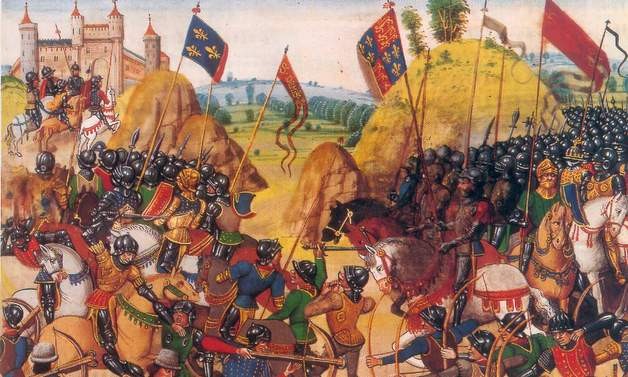When he arrived at the hill, he knew that he did not need to go any further.
This resolve seemed out of place, given that he would be facing a force about twice as large as his own. Furthermore, he was far from home. Although the campaign was one of invasion (or, for him, reclamation), his strategy for this battle would be a defensive one.
His battle lines selected, there was but one further task to complete. To round out the field commanders in his army, he opted to knight his sixteen-year-old son, and to entrust him with an entire wing of the force, one division of the three. After today, he would be notorious: his appellation “The Black Prince” signified his fearsome attire and military prowess.
And so, Edward the Third, King of England, pretender to the throne of France, prepared to make good on his claims. But King Philip VI was also ready to fight for his cause. Nor was he unprepared: as mentioned, the English were outnumbered two to one. While contemporaries claim 15,000 crossbowmen were at his disposal, the actual figure seems to have numbered around 6,000. Even so, these experienced Genoese mercenaries would be equal in number to half of Edward’s army.
But, for all the talk of numbers, and odds, they meant little on the evening of August 26, 1346, in Crécy. The English shattered the French force, and secured both possession of Calais as well as the standing to prolong this six year campaign into a Hundred Years’ War.
There were several factors that led to the decisive turn of events, the most notable being the difference between English longbowmen and Italian crossbowmen. Crossbows were considered fearsome in Medieval Europe, even to the point of controversy (some Church councils tried to ban them, to no avail).
Unfortunately for them, the English bowmen could fire six times a minute, from great distances, rendering the Italian crossbowmen (capable of two shots a minute at a much shorter range) useless. French knights proved no better against such forces, and Edward carried the day.
Such a radical imbalance in contenders is not unique to military history:
Then a blind and dumb demoniac was brought to him, and he healed him, so that the dumb man spoke and saw. And all the people were amazed, and said, “Can this be the Son of David?” (Mt 12:22-23)
Christ is not afraid to use His overwhelming field advantage against Satan, so much so that the people marvel at the ease with which he drives out demons. Some, however, look upon this manifestation of divine power and murmur. A sign this great, they reason, could only be worked by Satan:
But when the Pharisees heard it they said, “It is only by Be-el’zebul, the prince of demons, that this man casts out demons.” (Mt 12:24)
Confronted with this obstinacy, Our Lord again overwhelms the opposition, by the power of His words:
Knowing their thoughts, he said to them, “Every kingdom divided against itself is laid waste, and no city or house divided against itself will stand; and if Satan casts out Satan, he is divided against himself; how then will his kingdom stand? (Mt 12:25-26)
From a distance, Christ has systematically shot out every argument they have advanced. But, being a good rabbi, He is not finished:
And if I cast out demons by Be-el’zebul, by whom do your sons cast them out? (Mt 12:27)
The hypocrisy of the Pharisees is fully unmasked. For they were content with minor exorcists, while barricading their hearts against a Messiah who could work greater deeds. There is no doubt Our Lord could storm such a flimsy barricade, but instead He invites them to reconsider and repent:
But if it is by the Spirit of God that I cast out demons, then the kingdom of God has come upon you. (Mt 12:28)
The Lord’s work is accomplished not by words alone. Instead, as the Eternal Word, His words effect deeds, in concert with the Holy Spirit. As the psalmist sings:
The voice of the LORD full of power,
the voice of the LORD full of splendor.
The voice of the LORD shatters cedars. (Ps 29: 4-5)
It is true that our invocation of God seldom calls down fire from heaven, or shatters cedars with a decent tongue lashing. However, we have been promised by the Lord Himself that, calling upon the name of Christ, we will accomplish even greater deeds than His. These deeds may not be as stunning as those described here, but we have been promised that they will be greater. May we, in carrying out the Savior’s charge in both word and deed, make the words of St. Paul our own:
For our Gospel did not come to you in word alone,
but also in power and in the Holy Spirit and with much conviction. (1 Th 1:5)
✠
Image: Loyset Liédet, Battle of Crécy







